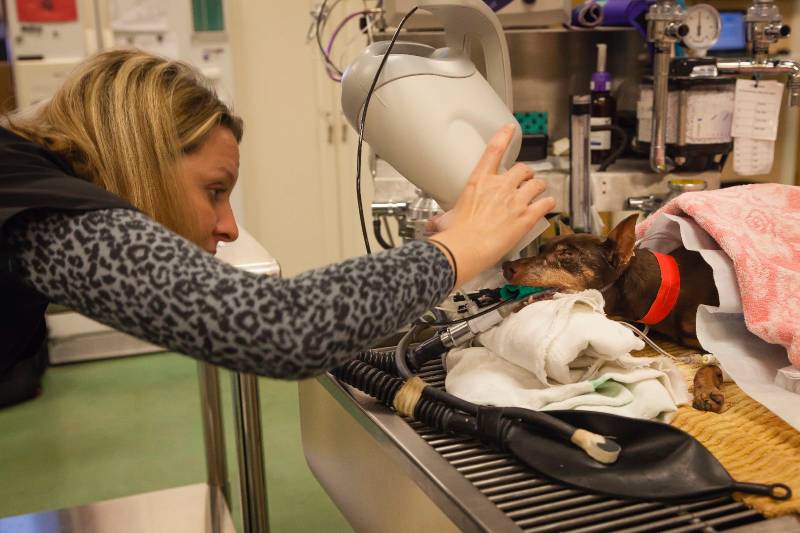Pet Dental X-Rays
Pet Dental X-Rays in Westwood, New Jersey
Dental X-rays are a vital resource for diagnosing and treating oral health issues in pets. At Westwood Regional Veterinary Hospital, our team uses advanced technologies for dental X-rays, capturing detailed images of the teeth, roots, and surrounding structures. These images help us develop precise treatment plans tailored to the specific needs of your pet. Pet owners in Westwood, NJ, and the Tri-State area trust us to provide comprehensive dental care for their beloved companions.

Understanding Pet Dental X-Rays
Veterinarians may perform initial dental exams to detect issues with the teeth and mouth. However, in dogs and cats, more than half of the tooth is below the gumline. X-rays allow veterinarians to understand what’s happening at the roots to better identify potential dental problems.
You may hear dental X-rays referred to as radiographs. The X-ray is the beam of radiation used to create the image of your pet’s mouth. The radiograph is the resulting image that veterinarians use to examine your pet’s teeth and gums in greater detail.
With X-rays, veterinarians can detect early signs of dental conditions and treat them before they become bigger problems. They might also conduct X-rays as a preliminary step before oral surgery like tooth extractions. X-rays can also help monitor tooth development in young animals for early detection of abnormal growth. They can provide peace of mind as they allow veterinarians to educate pet owners about the nature and cause of the problem. Pet owners become aware of their companion’s diagnosis and treatment.
The main value of dental X-rays is guiding diagnoses and treatments for pets with dental concerns. Here’s how X-rays help veterinarians understand more about the following diseases and conditions:
- Periodontal disease: Many cats and dogs show signs of periodontal disease early in their lives. Periodontal pockets, which might indicate disease, can be difficult to identify without the precision of dental X-rays.
- Oral growths: X-rays provide more context when veterinarians suspect oral tumors, lesions, cysts, or other growths. They enable early detection for prompt treatment and a higher possibility of successful treatment.
- Dental fractures: Some fractures are visible to the naked eye, but others require dental X-rays to confirm.
- Tooth resorption: Resorptive lesions are common in cats. Affected teeth may retain their root and pulp structure, which dental X-rays can indicate. X-ray images help veterinarians determine whether tooth extraction is necessary.
- Deciduous teeth: If your pet’s baby teeth don’t fall out, veterinarians may need to extract them. Dental X-rays can guide this procedure.
- Other abnormalities: X-rays can help when understanding irregularities like missing or worn teeth or problems with the jaw.
As part of comprehensive dental care, X-rays promote optimal oral hygiene and protect against future complications.
What to Expect With Pet Dental X-rays
Before a dental X-ray, pet dentists will administer anesthesia to help your pet relax. Anesthesia ensures your pet remains still during the X-ray, to help veterinarians get the most detailed images. Veterinarians will first conduct bloodwork to check your pet’s kidney and liver function and ensure they can safely administer anesthesia.
The general recommendation for all pets is to receive dental X-rays once a year, regardless of their oral health. Additional X-rays may be necessary as pet dentists detect abnormalities during regular dental exams. Surface-level concerns that might prompt veterinarians to recommend dental X-rays include:
- Broken, discolored, or missing teeth
- Swelling and inflammation of the gums
- Signs of oral growths
- Bad breath
Pet owners can be understandably nervous about their pets needing dental X-rays. Pet X-rays use the appropriate amount of radiation for dogs and cats. Reports of pets experiencing harmful effects from radiation are rare. You can rest assured our compassionate team will take every step to ensure your pet’s safety and comfort.
Dental Care at Westwood Regional Veterinary Hospital
Led by a team of experienced veterinarians (and animal lovers), our dental care services support your pet’s overall health and wellness. Routine dental exams help us respond to problems promptly and prevent them from progressing. Teeth cleaning ensures your pet maintains a pearly-white smile and fresh breath. When oral surgery or tooth extraction is necessary, we leverage advanced tools for precise procedures and better results.
We understand all pets are different and offer specialized care options to meet a wide range of needs. If your pet must stay overnight, experienced technicians will watch over them. Feel free to call in the middle of the night to check on your pet.
Pet Dental X-Rays in Westwood, New Jersey
From dental care to emergency visits to physical therapy, make Westwood Regional Veterinary Hospital your go-to for veterinary services. We serve pet owners in Westwood, NJ, and throughout the Tri-State area, and strive to deliver the best experience for every furry friend. Contact us to learn more about veterinary X-rays or book an appointment today.
Service Available At:
Westwood
- 346 Kinderkamack Rd.
Westwood, NJ 07675 - 201-885-5040
- Monday to Sunday: 9 AM to 10 PM